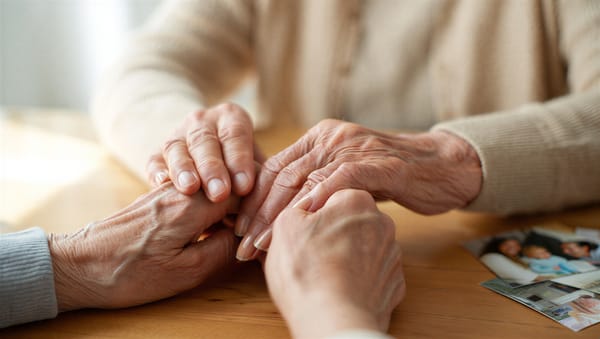How to Cope with Grief: An Emotional Survival Guide for the First Months of Loss
Feeling overwhelmed by grief? Find immediate, gentle strategies to help you survive the hardest days and take care of yourself emotionally during the first months of loss.

If you're reading this right now, you're likely in one of the most painful periods of your life. The weight of grief might feel unbearable. You might be wondering how you'll make it through today, let alone tomorrow. You might feel like you're losing your mind, or that the pain will never ease.
We want you to know something important: what you're feeling right now is not abnormal. The overwhelming nature of early grief, the physical heaviness, the fog that makes simple tasks feel impossible, the waves of emotion that crash over you without warning—all of this is your heart and body responding to a profound loss. You're not broken. You're grieving.
This guide isn't about fixing you or rushing your process. It's about giving you gentle, practical strategies to help you survive the immediate crisis of grief. We're not going to tell you that things will be okay soon, or that you need to be strong. Instead, we're going to meet you exactly where you are right now and offer you tools that might make today a little more bearable.
Key Takeaways
- Grief in the first months often feels overwhelming, disorienting, and physically exhausting—this is a normal response to loss, not a sign that something is wrong with you
- Basic survival strategies like eating small amounts regularly, staying hydrated, and asking for specific help can make difficult days more manageable
- Your grief doesn't follow a timeline or prescribed stages—it's uniquely yours, and there's no "right" way to experience it
- Physical symptoms of grief (exhaustion, body aches, difficulty concentrating) are real physiological responses to emotional trauma
- Creating tangible connections to your loved one when you're ready can provide comfort without requiring you to make permanent decisions right now
Reflections on love, loss, and the ways we carry them.
The earliest months of grief, survival, not healing, is the goal. Your mind, body, and spirit are in shock. As Pauline Boss once wrote, “You don’t get over it—you get through it.” Grief is not a problem to be solved but a profound human experience to be tended to with gentleness.
In my practice, I’ve seen how disorienting this stage can be. One client, a widower named Ben, described it as “walking underwater.” He couldn’t concentrate, forgot to eat, and felt guilty for every moment of rest.
Together, we focused on simple acts of survival—eating small meals every few hours, drinking water, and asking his sister to handle groceries and errands. He didn’t need to “move on.” He just needed to make it through each day.
Acute grief feels like physical pain because it is. Neuroscience confirms that the same areas of the brain activated by bodily injury are also engaged when we experience deep emotional loss. That heaviness in your chest, that fog in your mind, they’re not imagined. They’re your body’s way of protecting you from overwhelm.
When waves of sorrow hit, grounding techniques can help: plant both feet on the floor, breathe deeply, and notice what’s around you. As one bereaved mother told me, holding her daughter’s Parting Stone in her palm during these moments “helped me remember that love doesn’t end, it only changes form.”
If you’re in that early, unbearable space right now, please know this: your inability to function normally isn’t failure. It’s biology. It’s love trying to find its footing in a world that suddenly feels unfamiliar. For now, surviving today is enough. Be impossibly gentle with yourself. In time, your heart will learn how to carry both the ache and the love together.
Cathy Sanchez Babao
Parting Stone Grief Coach
How Do You Cope with Overwhelming Grief?
To cope with overwhelming grief in the first months, focus on basic survival rather than healing: eat small amounts every few hours even when you're not hungry, stay hydrated, rest when exhausted even if you can't sleep, and ask specific people for concrete help like meals or errands. Accept that concentration and decision-making will be impaired, so postpone major choices when possible. Normalize your experience by understanding that intense emotional waves, physical exhaustion, and feeling like you're "going crazy" are all typical grief responses. When waves hit, use grounding techniques like placing both feet flat on the floor, taking slow breaths, or holding something cool in your hands. Most importantly, give yourself permission to simply survive each day rather than expecting yourself to function normally.
Understanding What's Happening to You Right Now
The Reality of Acute Grief
The first weeks and months after a loss represent what mental health professionals call acute grief, a period when your entire system—emotional, physical, cognitive—is responding to trauma. Research from the Center for Complicated Grief shows that during this time, your brain is actually processing the loss in ways similar to physical pain. When you say your heart hurts, that's not just a metaphor. Your body is experiencing genuine physiological distress (Shear, 2015).
Many people describe this period as feeling like they're underwater, or moving through thick fog. You might find yourself standing in a room with no memory of why you went there. You might read the same sentence five times without comprehending it. You might forget to eat, or eat constantly without tasting anything. These aren't signs of weakness or mental illness—they're normal responses to abnormal circumstances.
Sophie from Katy, Texas 🖤 describes this overwhelming feeling: "Everyone in our family grieves differently having the ability to offer everyone a special something was so impactful. Mine was small and fits so nicely in the palm of my hand. Really special prayer moments when grief is overwhelming at times."
@ohthatjenny If you would like more information on Parting Stone and the process please dont hesitate to ask. I feel so confident that Chris would love this way of keeping his memory alive. He is SO missed and loved still and always. #partingstone #partingstones #lifeafterloss #griefandloss @PartingStone
♬ original sound - Jenny
Why Everything Feels Impossible
During acute grief, your brain is working overtime to process what has happened while simultaneously trying to protect you from being completely overwhelmed. This means your capacity for normal functioning is genuinely compromised. Decision-making becomes harder. Focus becomes elusive. Energy reserves deplete rapidly.
According to grief researcher M. Katherine Shear, the early grief period involves your brain trying to reconcile two conflicting pieces of information: the knowledge that your loved one has died, and the deep attachment bonds that make your mind expect them to still be present. This creates a kind of cognitive dissonance that requires enormous mental energy to navigate (Shear, 2015).
Understanding this can provide relief. When you can't remember simple things, when you can't focus on work, when you feel exhausted after minimal activity—you're not failing. Your brain and body are doing exactly what they're designed to do in response to loss.

Immediate Survival Strategies
The Basics of Getting Through Today
Right now, you don't need to think about healing or finding meaning or any long-term grief work. You need to think about making it through today. Here are concrete, practical strategies for immediate survival.
- Eating when nothing appeals to you. Grief often suppresses appetite or makes food taste like nothing. But your body still needs fuel, especially when it's under stress. Keep simple, high-calorie foods accessible: protein bars, peanut butter, crackers, smoothies, soup. Aim for eating something small every three to four hours, even if it's just a few bites. Think of it as medicine rather than meals.
- Hydration matters more than you think. Dehydration amplifies every grief symptom—headaches, fatigue, difficulty thinking, nausea. Keep water bottles in multiple places. If plain water feels impossible, try herbal tea, juice, or beverages with electrolytes. Small sips throughout the day are better than nothing.
- Sleep and rest are different things. Many grieving people can't sleep normally. That's okay. Rest doesn't always mean sleep. Lying down in a quiet, dark space. Sitting in a comfortable chair with your eyes closed. Watching something mindless on television. Rest is about giving your body and mind periods of reduced demand.

Managing Waves of Intense Emotion
Grief often comes in waves, and in the early months, these waves can feel like they'll drown you. You might be functioning adequately one moment, then hit by a tsunami of pain the next. Learning to ride these waves rather than fight them can help.
When a wave hits, try grounding techniques. Plant both feet firmly on the floor. Name five things you can see, four you can hear, three you can touch, two you can smell, one you can taste. This brings your awareness back to the present moment and can help intense emotions pass through you rather than overwhelming you completely.
Alessandra from Orlando, Florida 🖤 found that having something tangible helped during these overwhelming moments: "Having the ability to carry pieces of her has helped it hurt less because I can hold her and kiss her when the grief is especially overwhelming."
Physical grounding can also help. Hold something cold—an ice cube, a frozen water bottle. Place your hand on your heart and breathe slowly. Go outside and feel the air on your face. These aren't ways to make grief go away; they're ways to stay present with it without being completely consumed.
The Physical Experience of Grief
Your Body's Response to Loss
Grief isn't just emotional. It's profoundly physical. Many people experience chest tightness, body aches, exhaustion, headaches, digestive issues, and a weakened immune system in the early months after a loss. Research published in The Lancet demonstrates that grief creates measurable stress on the body, particularly the cardiovascular system (Stroebe, Schut, & Stroebe, 2007).
You might feel physically ill. You might have the sensation of your heart literally aching. You might feel an uncomfortable tightness in your throat or chest. These physical sensations are real responses to emotional trauma, not imagined symptoms.
Respecting your body's limits. Your body is under enormous stress right now. Activities that were once easy might feel exhausting. Give yourself permission to move more slowly. Rest more often. Say no to obligations that feel like too much. This isn't self-indulgence; it's survival.
Movement as medicine. While rest is essential, gentle movement can also help. Even a short walk around the block can release some of the physical tension that grief creates. The goal isn't exercise in the traditional sense; it's about moving the energy of grief through your body rather than letting it solidify into chronic pain or tension.
When Concentration Disappears
One of the most disorienting aspects of early grief is cognitive impairment. You might find yourself unable to focus on tasks that once required minimal effort. Reading becomes difficult. Following conversations feels exhausting. Making decisions, even simple ones, feels overwhelming.
This phenomenon, sometimes called "grief brain" or "widow brain," is well-documented in grief research. Your mind is allocating enormous cognitive resources to processing loss, leaving less available for everyday functioning. This isn't permanent brain damage. It's temporary cognitive reallocation (Worden, 2018).
Practical strategies can help. Write everything down, even things you think you'll remember. Use phone reminders for important tasks. Give yourself twice as long as usual to complete projects. When possible, postpone major decisions for several months. Your cognitive functioning will gradually return as the acute phase of grief passes.

Creating Your Support System
Asking for the Help You Need
One of the most challenging aspects of early grief is asking for help, especially if you're someone accustomed to being self-sufficient. But trying to navigate this alone makes everything harder. The question isn't whether you need help—you do. The question is how to ask for it effectively.
Be specific. Instead of saying "let me know if you need anything," people respond much better to direct requests. "Could you drop off a meal on Tuesday?" "Would you be willing to walk my dog twice this week?" "Can you sit with me for an hour on Thursday?" Specific requests make it easy for people to actually help.
Create a support schedule. If multiple people want to help, consider having someone coordinate so you're not managing logistics while grieving. Some families use meal trains, shared calendars, or simple group texts to organize support without burdening the grieving person with coordination.
Rebecca from Connecticut 🖤 shares: "I feel like Justin is with me wherever I go. This is a tangible way to hold him and bring him with me."
Setting Boundaries with Well-Meaning People
People often don't know what to say to someone who's grieving, so they say unhelpful things. They might tell you your loved one is "in a better place," or that "everything happens for a reason," or that you need to "be strong." These platitudes, while usually well-intentioned, can feel dismissive or painful.
You have permission to set boundaries. You can say, "I appreciate your concern, but I'm not ready to talk about it." You can leave social situations that feel too difficult. You can ignore calls and messages when you don't have energy to respond. Protecting your emotional space during this vulnerable time isn't rude—it's necessary.
Some people will naturally be better at supporting you than others. Notice who shows up in ways that actually help versus who creates more burden. Give yourself permission to lean on the people who get it and create distance from those who don't, at least for now.

A New Way to Hold Close What Matters Most
We transform cremated remains into beautiful, touchable stones that bring comfort when you need it. Something you can hold, share, and keep close.
Navigating Triggers and Difficult Moments
The Ambush of Everyday Reminders
Grief has a way of hiding in the most unexpected places. You might be managing relatively well, then walk past their favorite restaurant or hear a song they loved or smell their cologne on a stranger, and suddenly you're back in the depths of pain. These grief triggers can feel like ambushes.
Understanding that triggers are normal doesn't make them hurt less, but it can help you prepare for them. As you become aware of specific triggers, you can sometimes brace yourself. You might avoid certain places during the most acute phase of grief. You might have a friend accompany you to situations you know will be difficult.
But you can't avoid all triggers, and trying to do so can actually prolong grief. Over time, repeated exposure to triggering situations typically reduces their power. The first time you hear that song it might bring you to your knees. The twentieth time, it might bring tears but not devastation. This gradual desensitization is part of grief's natural evolution.
Getting Through Firsts
The first year of grief is filled with painful milestones: the first birthday without them, the first holidays, the first anniversary of their death. These "firsts" often feel impossibly hard because you're navigating them without any roadmap for how to do it.
Give yourself permission to change traditions if they feel too painful. You don't have to celebrate holidays the same way. You don't have to attend events that feel overwhelming. You can create new rituals that honor both your grief and the continuing relationship with your loved one.
Plan ahead for difficult days, but hold plans loosely. You might think you want company, then realize you need solitude. You might plan to visit the cemetery, then feel unable to go. Whatever you actually feel in the moment is okay. Grief doesn't care about your plans.
When Grief Comes in Unexpected Forms
Grief isn't just sadness. It's anger at the unfairness of loss. It's guilt about things said or unsaid. It's anxiety about your own mortality or the mortality of other loved ones. It's sometimes even relief, particularly after a long illness, which can then bring its own guilt.
All of these emotions are normal grief responses. If you feel angry, that doesn't mean you didn't love them enough. If you feel guilty, that doesn't mean you failed them. If you sometimes feel relief, that doesn't mean you're glad they're gone. Grief encompasses the full spectrum of human emotion, often simultaneously.
The Center for Complicated Grief emphasizes that grief doesn't follow neat stages. You don't move through denial, then anger, then bargaining in a linear fashion. Instead, you might experience all these feelings in a single hour, or cycle through them repeatedly. This isn't wrong. It's simply how grief works (Shear, 2015).
The cremated remains of Garth's mother felt meaningless sitting in his clothing closet for 2 decades. Learn how solidified remains helped dissolve the relationship barrier he felt with her and integrate her memory into daily life.
The Question of Meaning and Connection
When Memorial Decisions Feel Overwhelming
In the first months of grief, making decisions about memorialization can feel impossible. Funeral homes and well-meaning family members might push for immediate choices about urns, burial plots, or scattering ashes. But you don't have to decide everything right now.
Many people find that traditional options for cremated remains don't feel adequate for the relationship they've lost. Looking at an urn on a shelf might feel disconnecting rather than comforting. The thought of scattering ashes might bring anxiety about letting go permanently. These feelings are valid.
Hannah from Lansing, Michigan 🖤 describes her experience: "The whole process was smooth. I love having them here on my mantle in a glass container to see, talk to, and touch whenever I want."
What grief research consistently shows is that maintaining a continuing bond with your deceased loved one supports healthy grieving better than trying to "let go" (Klass, Silverman, & Nickman, 1996). This doesn't mean living in denial or refusing to accept death. It means finding ways to carry love forward even as you adapt to physical absence.
Creating Tangible Connection
For many people, having something physical to hold and touch provides comfort in a way that abstract memorials don't. When your brain is struggling to reconcile the absence of someone who was physically present in your life, tangible reminders can provide an anchor.
Some families discover that transforming cremated remains into solidified remains creates this kind of tangible connection. Through a careful 8-10 week process, cremated remains can be returned as a collection of smooth, stone-like forms that can be held, shared with family members, displayed in your home, or carried with you. This isn't about making decisions you'll regret or rushing your process. It's about knowing that options exist when you're ready to consider them.
Sharon from Richmond, Virginia 🖤 shares her experience: "I keep the stones in several locations; e.g., beside my bed, in a coat pocket, on my desk at home, etc. Having them where I can see them and in different places gives me a feeling of her being close. Picking up and rubbing the stone has a soothing effect and gives me the ability to take a deep breath and release some of the everyday stress."
The beauty of solidified remains is that they provide flexibility. You can keep some, share some with family members, take some to meaningful places, or create displays that feel right for your specific relationship and grieving style. There's no rush to make these decisions, and no single right way to do it.
Permission to Wait
If you're not ready to think about memorialization right now, that's completely okay. Some people make decisions quickly and find peace in them. Others need months or even years before they know what feels right. Neither approach is better or worse—they're simply different responses to different grief experiences.
What matters most is giving yourself permission to move at your own pace. Don't let anyone pressure you into decisions before you're ready. Don't compare your timeline to anyone else's. Your grief, your timeline, your choices.

When Grief Becomes More Than You Can Manage Alone
Recognizing When Professional Help Matters
Most grief, even when it's agonizing, is a normal response to loss that gradually becomes more manageable over time. But sometimes grief becomes what's clinically called "complicated grief" or "prolonged grief disorder"—a pattern where grief symptoms remain intensely debilitating for an extended period without improvement.
Warning signs that professional support might help include: feeling completely unable to function in daily life after several months, experiencing intense suicidal thoughts, feeling stuck in denial or disbelief long after the loss, developing substance abuse issues, or feeling that grief is actually getting worse rather than gradually shifting.
Research from the National Alliance on Mental Illness (NAMI) shows that grief counseling, particularly with therapists trained in grief and loss, can provide tools and support that make navigating grief more manageable (NAMI, 2022). This isn't about rushing your grief or fixing you. It's about having skilled support as you move through one of life's most difficult experiences.
Finding the Right Support
Not all grief counselors work the same way, and finding someone whose approach resonates with you makes a significant difference. Some therapists focus on cognitive approaches, helping you identify and challenge unhelpful thought patterns. Others use more experiential approaches, incorporating art, writing, or ritual into grief work.
Many communities have grief support groups, either through hospice organizations, religious institutions, or mental health centers. These groups provide the unique comfort of being with others who truly understand what you're experiencing. Sometimes just knowing you're not alone in your pain provides unexpected relief.
Online resources have also expanded dramatically. Virtual therapy, online support groups, and digital grief communities mean you can access support even if local resources are limited or you prefer the privacy of remote connection.
The Difference Between Normal Grief and Depression
This is a question many grieving people ask: Am I just grieving, or am I depressed? The answer is that grief and depression can co-occur, and distinguishing between them requires some nuance.
Normal grief, however painful, typically includes moments of connection, meaning, or even brief lightness interspersed with the pain. You might laugh at a memory, feel love when thinking of your person, or find moments of peace. Depression, in contrast, often involves a more persistent flatness—an inability to feel much of anything, including love and connection.
If you're experiencing persistent feelings of worthlessness, inability to experience any positive emotions, complete withdrawal from all relationships, or ongoing suicidal thinking, these symptoms suggest depression alongside grief and warrant professional evaluation (American Psychiatric Association, 2013).
The good news is that both grief and grief-related depression are treatable. Seeking help isn't giving up on your loved one or betraying your grief. It's giving yourself the support you need to carry your grief without being destroyed by it.
Learning to Live With Grief

Grief Doesn't Have an End Date
One of the most important truths about grief is that it doesn't end. You don't "get over" the death of someone you love. What changes over time is your relationship with the grief. What once felt unbearable gradually becomes something you can carry. The waves that once felt constant become less frequent, though sometimes still intense.
Research on bereavement consistently shows that healthy grieving isn't about detachment or forgetting. It's about learning to maintain connection while simultaneously adapting to life without physical presence. The psychiatrist William Worden describes this as finding "an appropriate place for the deceased in their emotional lives—one that enable them to go on living effectively in the world" (Worden, 2018).
This means you don't have to let them go. You don't have to stop talking about them, or remove their photos, or avoid memories. You can carry their influence, their love, and their impact forward as you continue living. The goal isn't to move on from them. It's to move forward with them.
Permission to Experience Joy Again
At some point, whether it's weeks or months or longer, you might find yourself laughing at something. Or enjoying a meal. Or feeling a moment of peace or happiness. And then you might immediately feel guilty, as if experiencing anything positive betrays your loved one or diminishes your grief.
Please hear this: feeling moments of joy, peace, or happiness doesn't dishonor your loved one's memory. It doesn't mean you're forgetting them or that you didn't love them enough. In fact, most people who loved you would want you to eventually experience life's goodness again, even as you continue to miss them.
Grief and love can coexist. Missing them and feeling grateful for good things in your life can coexist. Honoring their memory and building a life that includes joy can coexist. These aren't contradictions—they're the both/and of being human.
Cindy from her location describes this transformation: "Losing Steve at just 65 made me question what the future would look like without him. The grief was overwhelming, and I often felt lost. But when his stones arrived, I found something I didn't expect—hope. Holding them gave me a tangible connection to him, something that brought comfort during such an uncertain time."
Building a Life That Includes Both Loss and Meaning
Eventually, the work of grief involves rebuilding a life that acknowledges and integrates your loss while also creating new meaning and connection. This doesn't happen quickly, and it doesn't happen in a straight line. But it does happen.
You might discover new priorities. Many grieving people report that loss clarifies what truly matters, leading them to make changes in work, relationships, or how they spend their time. You might find yourself drawn to helping others who are grieving. You might pursue something your loved one always encouraged you to try. You might simply live more intentionally, more aware of life's preciousness and fragility.
The grief never disappears entirely, but it transforms. Sharp pain becomes tender ache. Constant presence becomes occasional visitor. Overwhelming devastation becomes deep sadness mixed with gratitude for the time you had. This transformation happens not through effort or willpower, but through the slow work of time, support, and gentle self-compassion.

Moving Through the Fog
If you've read this far, you've already demonstrated something important: you're looking for ways to survive this. That impulse toward survival, even when everything feels hopeless, is precious. Honor it.
Remember that you don't have to do this perfectly. There's no right way to grieve. Some days you'll manage better than others. Some days just getting out of bed is enough. Some days you'll surprise yourself with brief moments of normalcy. All of it is okay.
The strategies in this guide aren't meant to fix your grief or make it disappear. They're meant to help you survive the hardest days. To give you tools for the moments when grief feels like it might actually kill you. To remind you that what you're experiencing, however agonizing, is a natural response to love and loss.
Your grief is as unique as your relationship with the person you've lost. Trust your own process. Seek support when you need it. Be impossibly gentle with yourself. And remember that surviving today is enough.
Frequently Asked Questions
How long does the intense grief last after someone dies?
Intense, acute grief typically lasts between 6-18 months for most people, though this varies significantly based on the relationship, circumstances of death, and individual factors. During this period, grief symptoms are most severe and daily functioning may be significantly impaired. The intensity usually begins to lessen gradually after the first several months, though grief waves and anniversary reactions can continue indefinitely. It's important to understand that grief doesn't end—it transforms into something more manageable over time as you learn to carry it alongside your ongoing life.
Is it normal to feel angry when grieving?
Yes, anger is one of the most common and normal grief emotions. You might feel angry at the person who died for leaving you, at medical professionals for not saving them, at yourself for things done or left unsaid, at others who still have their loved ones, or at the fundamental unfairness of death. This anger doesn't mean you didn't love the person enough or that you're grieving wrong. It's simply one of many emotional responses to loss. If anger becomes your only emotion or leads to destructive behavior, grief counseling can help you process it constructively.
When should I see a therapist for grief?
Consider seeing a grief therapist if you're experiencing prolonged inability to function in daily life (after several months), persistent thoughts of suicide or self-harm, grief symptoms that worsen rather than gradually improve over time, complete isolation from all relationships and activities, or development of substance abuse as a coping mechanism. Additionally, if you feel stuck in denial or disbelief long after the loss, or if your grief feels more intense than what seems typical, professional support can provide tools and perspective that make grieving more manageable. Seeking help isn't a sign of weakness—it's wisdom.
What are some healthy coping mechanisms for grief?
Healthy grief coping strategies include maintaining basic self-care (eating small amounts regularly, staying hydrated, resting when needed), accepting help from trusted people, using grounding techniques during emotional waves, gentle movement like walking, journaling feelings when words come, joining grief support groups, creating meaningful rituals to honor your loved one, and allowing yourself to feel emotions without judgment. What matters most is finding what works for your specific grief experience—there's no single "right" approach. Many people find that having something tangible to hold and touch provides comfort during difficult moments.
How do I cope with grief triggers and unexpected reminders?
Grief triggers—songs, places, smells, dates, or situations that suddenly bring intense pain—are a normal part of grieving that typically lessens over time through repeated exposure. When triggered, practice grounding techniques: place both feet flat on the floor, name things you can see and hear, hold something cold, or focus on slow breathing. You can temporarily avoid known triggers during acute grief, but eventually allowing yourself to experience triggered emotions helps them lose their overwhelming power. Plan ahead for predictable triggers like anniversaries or holidays by arranging support and giving yourself permission to change traditions if needed. Over time, these reminders often shift from purely painful to bittersweet.
Can grief make you physically sick?
Yes, grief creates real physiological stress on the body. Research shows that grieving people commonly experience chest tightness or pain, body aches, exhaustion, headaches, digestive problems, weakened immune function, changes in appetite and sleep, and increased risk of cardiovascular issues. These physical symptoms aren't imagined—they're your body's response to emotional trauma. The stress hormones released during grief affect your entire system. Taking care of physical basics (hydration, small meals, rest, gentle movement) helps support your body during this stress. If physical symptoms persist or worsen significantly, consult a healthcare provider to rule out other medical issues.
References
American Psychiatric Association. (2013). Diagnostic and statistical manual of mental disorders (5th ed.). American Psychiatric Publishing.
Klass, D., Silverman, P. R., & Nickman, S. L. (Eds.). (1996). Continuing bonds: New understandings of grief. Taylor & Francis.
National Alliance on Mental Illness. (2022). Grief and loss. NAMI Resource Guide. https://www.nami.org/About-Mental-Illness/Common-with-Mental-Illness/Grief-and-Loss
Shear, M. K. (2015). Complicated grief. New England Journal of Medicine, 372(2), 153-160. https://doi.org/10.1056/NEJMcp1315618
Stroebe, M., Schut, H., & Stroebe, W. (2007). Health outcomes of bereavement. The Lancet, 370(9603), 1960-1973. https://doi.org/10.1016/S0140-6736(07)61816-9
Worden, J. W. (2018). Grief counseling and grief therapy: A handbook for the mental health practitioner (5th ed.). Springer Publishing Company.








